By Anis Shakirah Mohd Muslimin
A new era has dawned in Saudi Arabia as women were finally allowed to vote and run in elections for the first time in the country’s history.
Saudi voters elected 20 women to local-government seats, according to results released to the Associated Press on Sunday. Although some students from Saudi Arabia at the University of Iowa have warmly welcomed the move, a few experts were a bit more skeptical about the transformation.
Karam Dana, an assistant professor in Global and Middle East Studies at the University of Washington-Bothell, said the move is a game changer in some ways and allows slightly more freedom for women in Saudi Arabia. However, he said, it is by no means a fantastic transformation.
“It’s a slight change in the right direction,” he said. “But there’s a lot more that needs to be done when it gets to women’s rights and position in society in Saudi Arabia.”
According to AP, the female candidates were elected to 10 different councils all over the country. Saudi Arabia’s capital and largest city, Riyadh, had the most women elected with four, AP reported.
Dana said he believes the Saudi government allowed the change because the country needed to provide some sort of freedom for women in order to avoid global isolation as the only country that bars women from driving.
“In order for [the Saudi Arabia government] to not continue to be taking the heat that it has been taking,” he said. “Especially because Saudi Arabia is a strategic ally of the United States and many different Western countries.”
Despite allowing women to finally vote for the first time, the ultra-conservative kingdom still imposes restrictions for women on many other daily activities, including driving. Dana said this restriction is a rationale of Saudi Arabia’s patriarchal society, which also exists in many other parts of the world but is intensified in Saudi Arabia.
Eric Bordenkircher, researcher at the UCLA Center for Middle East Development, said the move has the potential to be a good development, but it may just be window dressing.
“What the Saudis are doing here is to portray themselves as a more liberalizing country,” he said. “But at the end of the day, I would be very skeptical at least reluctant to see how far and where this goes.”
Some UI students from Saudi Arabia viewed the move positively and supported the government’s decision to allow women to vote.
Najwa Awad Algarni, who came to the UI to study English, said the Saudi government seeks to improve the status of women and the development of its society.
“This is a positive step in favor of women, and I support this government decision and see it in a timely manner,” she said. “And I wish peace and progress for the kingdom.”
UI sophomore Omar AbdulAziz bin Salamah said improving human rights, and women’s rights in particular, is a major concern for many Saudis.
“This change affects both men and women in a good way, especially women I believe,” he said. “It is good to know that where you are from is fighting to improve your rights.”
He said the change increases the faith of the Saudi people toward the government and shows that the government cares for its people. In response to some religious clerics who were unhappy with the change, Salamah said, there would always be people who will criticize any good decision and that it happens in every other country.
“I feel there will be more changes and more improvements in the future,” he said. “Mainly, allowing women to drive.”







